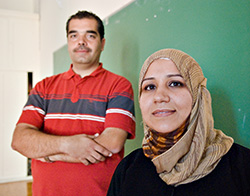From Jordan, a Visiting Delegation Teaches as Much as It Learns
If the definition of an educational exchange is that both sides learn, then this summer’s visit to
For the teachers themselves—four men and seven women, selected to represent each of the nation’s provinces after a nationally televised call for applications from Her Highness Queen Rania of Jordan—the six week visit was, at the most basic level, an opportunity to improve their English language skills and learn new methods of teaching English as a foreign language, a critical need in their country. For Linda Wine, Director of TC’s Teaching of English to Students of Other Languages (TESOL) Certificate Program, it was a chance to work with “an absolutely lovely group of people.”
For Teachers College,
But for all, perhaps one of the most lasting benefits was the opportunity to move beyond stereotypes, make new friends and learn about one another’s cultures.
“I think you can’t know a person until you meet him,” said Tahani Al-Momani near the end of her six-week experience, when TC President Susan Fuhrman, at a round-table discussion, asked the Jordanians what they would tell their countrymen when they returned home. “I found things here very different from the ideas we get in the movies. Americans are nicer, more hospitable, have more traditions and also have more—I am sorry for the word—manners.”
The visit by the Jordanians grew out of a dinner in fall of 2006 held at Columbia University President Lee Bollinger’s house. The guests included Fuhrman and Queen Rania, and the discussion that night resulted in a trip to
“We visited public and private schools to understand how we could help,” says Jim Purpura, Associate Professor of Applied Linguistics and Education, who was on that trip. “There are 300,000 teachers in
“English for Jordanians is becoming critically important,” adds Wine. “Improving instruction of English in schools there is seen as essential to the country’s economic future and stability within the region.”
Wine’s course, which students affectionately call “English Teaching Boot Camp,” offers four days a week of intense course work on language teaching, language learning, the relationship of language to culture, classroom management and other courses in the Certificate Program. Fridays are devoted to teaching in TC’s Community English Program, which serves adult language learners from the five
“All of the Jordanians who were here this summer spoke English well, but their listening comprehension varied,” Wine said. “They were also undergoing culture shock, as many of them had never left
Outside the TESOL program, the students went to barbecues, shopped at Macy’s, visited the Statue of Liberty and the Empire State Building, saw a Broadway show and mingled with their fellow students.
“This has been a wonderful experience,” said Affaf Koshman, one of the younger women among the visiting teachers. “I was afraid when I came here that people would dislike me—that they would see a woman wearing a headscarf and make assumptions about who I am. Instead, people have been so friendly. And I realize that I came with my own preconceptions as well. I did not think, for instance, that I would be able to make friends with Jewish people, but I was wrong—I have made some very warm friendships. So this has been a great thing.”
Published Wednesday, Sep. 5, 2007
